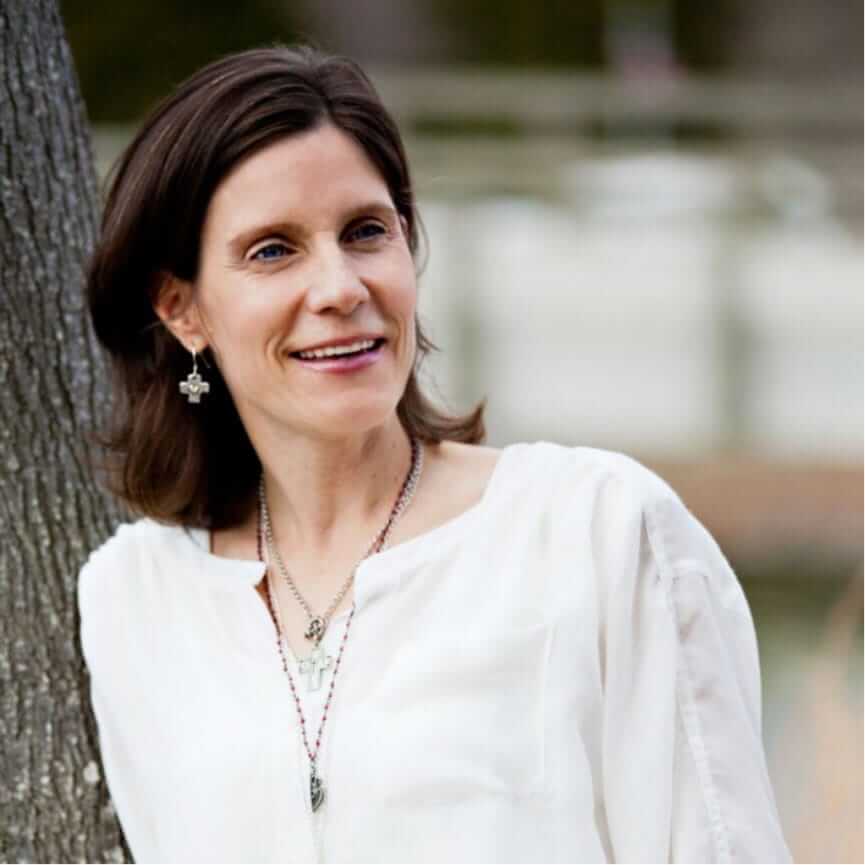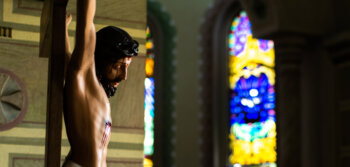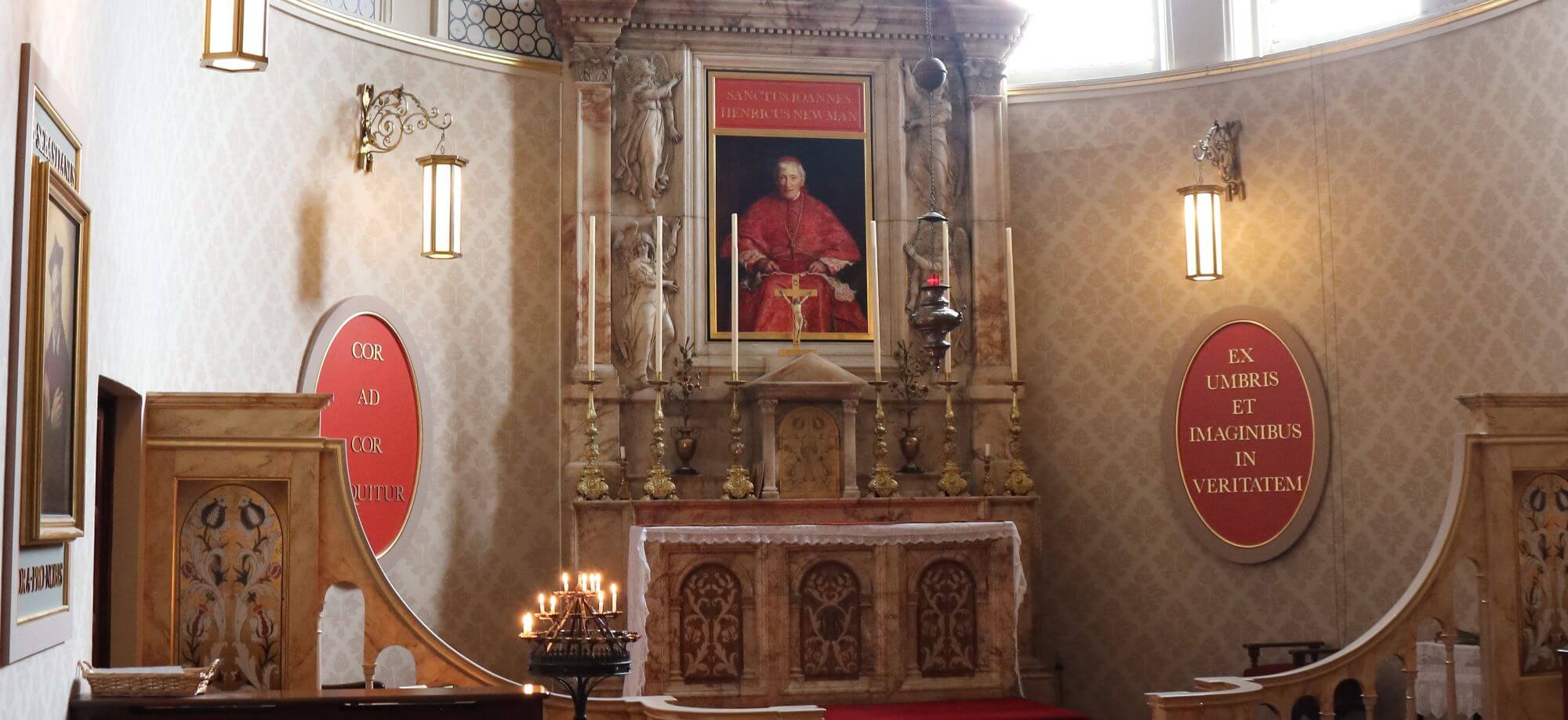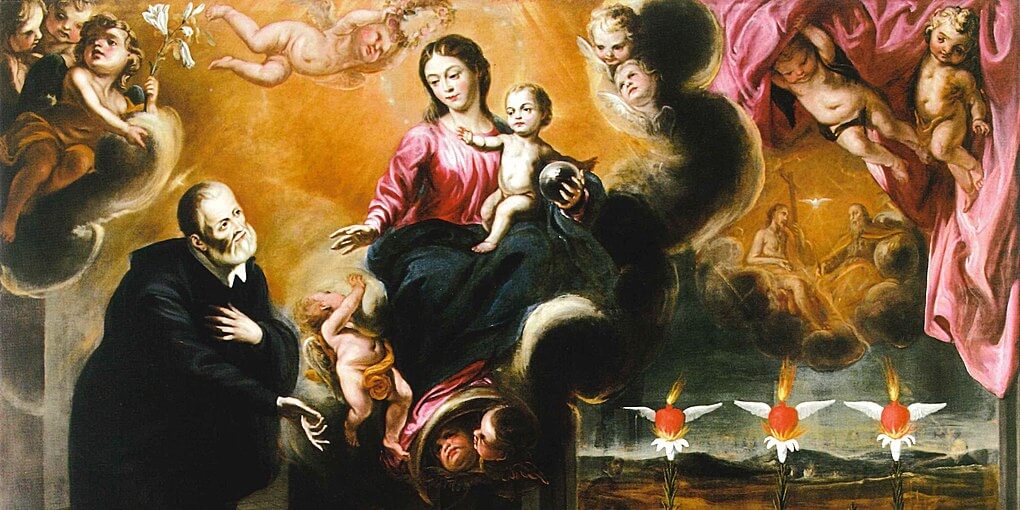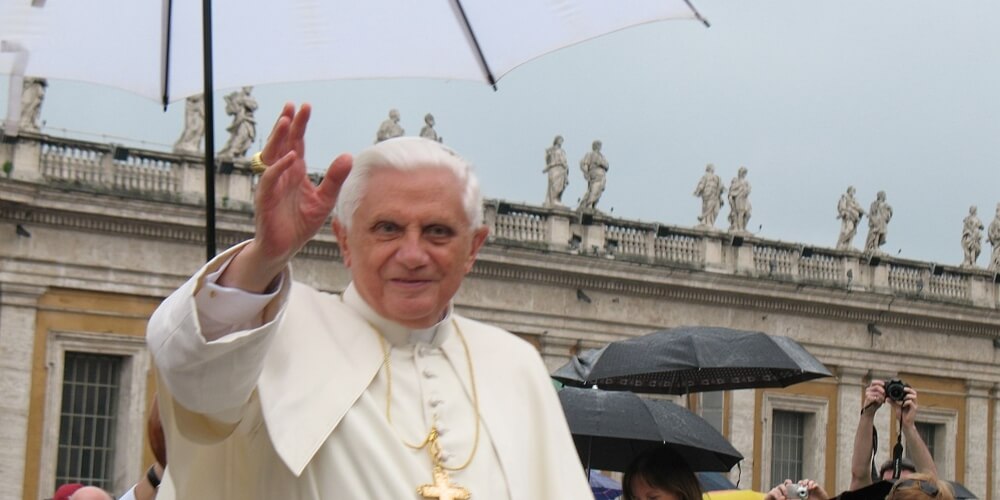
Pope Emeritus Benedict XVI passed away on Saturday at 9:34 AM in his residence at the Vatican’s Mater Ecclesiae Monastery, at ninety-five years of age.
“With sorrow I inform you that the Pope Emeritus, Benedict XVI, passed away today at 9:34 AM in the Mater Ecclesiae Monastery in the Vatican. Further information will be provided as soon as possible. As of Monday morning, 2 January 2023, the body of the Pope Emeritus will be in Saint Peter’s Basilica so the faithful can pay their respects.”
The Holy See Press Office
A Great And Holy Man
“The great question that will be with us throughout this entire book: What did Jesus actually bring, if not world peace, universal prosperity, and a better world? What has he brought?
The answer is very simple: God…. He has brought God, and now we know his face, now we can call upon him. Now we know the path that we human beings have to take in this world. Jesus has brought God and with God the truth about our origin and destiny: faith, hope and love. It is only because of our hardness of heart that we think this is too little. Yes indeed, God’s power works quietly in this world, but it is the true and the lasting power. Again and again, God’s cause seems to be in its death throes. Yet over and over again it proves to be the thing that truly endures and saves.”
Pope Benedict XVI, Jesus of Nazareth: From the Baptism in the Jordan to the Transfiguration
Although Cardinal Joseph Ratzinger prayed that he would not be the next pope and had made plans to retire with his brother Georg in his homeland of Germany, he would discover on April 19, 2005 that God had other plans for him.
At the age of seventy-eight, Joseph Ratzinger was the oldest Cardinal to be elected to the Chair of St. Peter since Pope Clement XII in 1730. Successor to Pope John Paul II, he took the name of Benedict, recalling St. Benedict of Nursia, the patron saint of Europe and founder of Western monasticism, becoming the 265th Pontiff of the Roman Catholic Church.
When elected, Pope Benedict XVI was the first German pope in 432 years and the 8th German pope in the Church’s history. He served as pope from 2005 to 2013.
Able to speak seven languages fluently, Pope Benedict XVI would be referred to as one of the greatest theologians of his time. In fact, he was a scholar and a theologian well before he became a cardinal, writing his first doctoral dissertation on St. Augustine’s ideas about the “House and the People of God” and his second dissertation on Bonaventure’s theology of revelation.
Along with his intensive work on the Catechism of the Catholic Church, Pope Benedict XVI wrote prolifically throughout his life: as a student, a priest, a cardinal, a pope, and as pope emeritus. He wrote approximately sixty-six books, among them Introduction to Christianity (1968); Called to Communion: Understanding the Church Today (1996); The Spirit of the Liturgy (2000); Jesus of Nazareth (2007); Jesus of Nazareth, Vol. II (2012); and Last Testament: In His Own Words (2016).
His encyclicals Deus caritas est (“God is Love”, December 25, 2005), Spe salvi (“Saved by Hope”, November 30, 2007), and Caritas in veritate (“Charity and Truth”, June 9, 2009) were rich in theological reflection, straightforward in tone, and accessible to readers.
Deus caritas est, promulgated within the first year after his election as pope, set what was to be a consistent message throughout his pontificate: Christ is a Person, not an idea; therefore Christianity is an encounter with the Person of Christ:
“We have come to believe in God’s love: in these words the Christian can express the fundamental decision of his life. Being Christian is not the result of an ethical choice or a lofty idea, but the encounter with an event, a person, which gives life a new horizon and a decisive direction.”
Deus Caritas Est, 1
His Formative Early Years
Pope Benedict XVI was born Joseph Ratzinger on April 16th, 1927, in Marktl am Inn, Bavaria, Germany, the youngest of three children. His father was a police officer and his mother had once worked as a hotel cook. The family moved often among the villages in rural Bavaria, and were influenced by the deeply Roman Catholic culture in that region of Germany.
Ratzinger was six years old when the Nazis took power in Germany in 1933. He would later write that, as the Nazis strengthened their hold on Germany, his father, who was a devout Catholic, became an ardent anti-Nazi and was hostile to the regime.
Ratzinger entered the seminary in 1939. In 1943 he and fellow seminarians were drafted into the German military. In his first year his unit was attacked by Allied forces but he did not take part in the battle because a finger infection had kept him from learning to shoot. He served in an antiaircraft unit in Bavaria before being sent to Hungary to set tank traps in 1945. He deserted in April of that year and after being captured by American forces, was held prisoner for a brief period. (Benedict XVI, Biography, Resignation, Legacy and Facts)
After the war, Ratzinger continued his education in the seminary and was ordained a priest in June 1951. In 1953 he was awarded a doctorate in theology at the University of Munich. Earning his teaching license in 1957, he taught dogma and theology at the higher school of philosophy and theology in Freising until 1959. He later taught at the University of Bonn (1959–69) and also at universities in Münster (1963–66).
The famous theologian Hans Küng invited Father Ratzinger to teach at Tübingen (1966–69), and in 1969 he moved to the University of Regensburg, where he later became vice president.
Eventually his work in theology attracted the attention of the archbishop of Cologne, Joseph Frings, who requested that Father Ratzinger serve as his expert assistant at the Second Vatican Council (1962-65).
Joseph Ratzinger Becomes A Cardinal And Close Advisor To JPII
In March 1977 Ratzinger was appointed archbishop of Munich and Freising by Paul VI, who three months later bestowed on him the cardinal’s hat. As a cardinal, he was made prefect of the Congregation for the Doctrine of the Faith by his friend Pope John Paul II on November 25th, 1981. They shared a common history, both having lived under totalitarian regimes, and their devotion as sons of the Church was very similar.
Cardinal Ratzinger would become one of Pope John Paul II’s closest advisors for the next twenty years.
It was under the direction of Pope John Paul II that Cardinal Ratzinger played an integral role in creating the Catechism of the Catholic Church. In June 1986, the Pope entrusted the task of coming up with a project for a universal catechism to a commission composed of twelve cardinals and bishops, over which Cardinal Ratzinger presided. While it took six years to finalize the text, in February 1992 the final copy was completed by the Commission and presented to the Holy Father, who officially approved it in June 1992.
In Last Testament, Pope Benedict referred to a question once asked of him about why the Catechism was necessary:
“… More and more people asked themselves then: ‘Does the Church still have a homogenous set of doctrines?’ They no longer knew what the Church actually believes. There were some very strong tendencies, with really good people on one side, too, saying: ‘a catechism cannot be produced any more.’ I said: ‘Either we still have something to say, in which case one must be able to describe it—or we have nothing left to say.’ In this way, I made myself a champion of the idea, with the conviction that we must be in a position to say what the Church believes and teaches today.”
Pope Benedict XVI, Last Testament
Pope Benedict XVI Continued What JPII Started
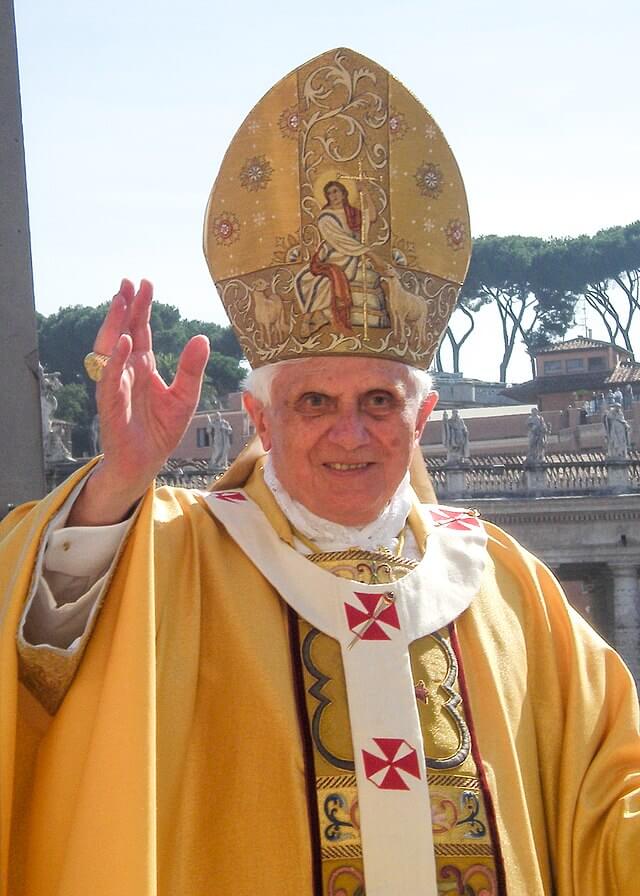
After his election as Pope, Benedict XVI continued much of what his predecessor had initiated, including the dialogue with Judaism and Islam and with other Christian churches. He declared that one of the goals of his papacy would be to revitalize the Catholic church in Europe and indicated that he would maintain the orthodoxy of Pope John Paul II on matters of sexuality, priestly celibacy, and ecclesiastical organization.
Mark Brumely, then president of Ignatius Press, spoke to EWTN shortly after the election of Pope Benedict XVI, and talked about who this new pope was:
Those who stereotype him as a rigid, backward thinker simply haven’t read him or fairly read him. His recent book on the Eucharist, “God is Near Us,” is a wonderful contribution to John Paul II’s Year of the Eucharist, and his “Introduction to Christianity” is a classic. His first volume of memoirs, known as “Milestones,” shows the profound faith and learning of this great man.
Mark Brumley in an interview on EWTN
While often thought of as an intellectual who could be cerebral and difficult to understand, his writings truly speak to the heart of what it means to be a Christian. His ability to candidly address our spiritual struggles reflected his own self-awareness and humility. He was direct and able to strike at the universal elements of the human condition.
An example of this can be seen in the following profound meditation in which he contemplates the lack of hope and the loneliness of the empty tomb on Holy Saturday:
“There is a Gospel scene which in an extraordinary way anticipates the silence of Holy Saturday and which again… seems to be a profile of the moment in history we are living now. Christ is asleep on a boat which, buffeted by a storm, is about to sink. The prophet Elijah had once made fun of the priests of Baal who were futilely invoking their god to send down fire on their sacrifice. He urged them to cry out louder in case their god was asleep. But is it true that God does not sleep? Does not the prophet’s scorn also fall upon the heads of the faithful of the God of Israel who are sailing with him in a boat about to sink? God sleeps while his very own are about to drown – is not this the experience of our lives? Don’t the Church, the faith, resemble a small boat about to sink, struggling futilely against the waves and the wind, and all the time God is absent? The disciples cry out in dire desperation and they shake the Lord to wake him but he is surprised at this and rebukes them for their small faith. But are things any different for us? When the storm passes we will realize just how much this small faith of ours was charged with stupidity. And yet, O Lord, we cannot help shaking you, God, you who persist in keeping your silence, in sleeping, and we cannot help crying to you: Wake up, can’t you see we are sinking? Stir yourself, don’t let the darkness of Holy Saturday last for ever, let a ray of Easter fall, even on these times of ours, accompany us when we set out in our desperation towards Emmaus so that our hearts may be enflamed by the warmth of your nearness. You who, hidden, charted the paths of Israel only to become a man in the end with men – don’t leave us in the dark, don’t let your word be lost in these days of great squandering of words. Lord, grant us your help, because without you we will sink. Amen.”
Cardinal Ratzinger, in The Anguish of an Absence
The brilliance of Benedict XVI was his capacity to enter into the heart of man. In an article from Inside the Vatican, Rev. Paschal Corby wrote of Pope Benedict:
“He knows of what we are made, and for what we are made. His encyclicals, the fruit of years of theological reflection, are testimony to this deep knowledge of man, who is fully revealed only in the person of Christ—in whom we encounter God, and who is the way, the truth, and the life (Jn 14:6)”.
Rev. Dr. Paschal M. Corby, OFM Conv., MBBS, BTheol, STL, STD, Inside the Vatican
Pope Saint John Paul II is often remembered for the motto of his own papacy—”Be not afraid”—and Pope Benedict XVI frequently echoed these hopeful words of his predecessor. He knew that fear and doubt could manifest in a lack of belief but he never shied away from addressing those things that might cause us to lack faith.
He challenged Christians to explore what it means to believe. “Belief,” he said in Introduction To Christianity, “…has always been a decision calling on the depths of existence, a decision that in every age demanded a turnabout by man that can only be achieved by an effort of will.”
Expressing what it meant for Christians to overcome fear and spiritual dryness, he challenged them to see faith not as a lack of difficulty but as means to walk through it:
Faith makes demands on our comfort; what we plan, what we propose for ourselves. … This thought should strike us anew: admittedly faith is uncomfortable, but only because it challenges us, compels us, to let ourselves be led where we do not wish to go. In this way it enriches us and opens for us the door to true life.
Joseph Cardinal Ratzinger, Co-Workers of the Faith
The Resignation of Pope Benedict XVI
In February 2013, Pope Benedict shocked the world when he announced that he would resign at the end of that month, citing age and health concerns. Throughout the history of the Catholic Church only five popes have chosen to resign instead of occupying the papacy until their death. He was the first pope to do this in approximately 600 years. His final public address in St. Peter’s Square drew a crowd of more than 50,000.
Taking the title Pope Emeritus, Benedict served his final day as pope on February 28, 2013. Traveling by helicopter, he left the Vatican for the summer papal residence in Castel Gandolfo, Italy, where he stayed while renovations were made to a convent, Mater Ecclesiae, in the southwest corner of Vatican City, which became his residence.
In a public letter written in February 2018, Benedict stated that he was nearing the end of his life. “I can only say that with the slow waning of my physical forces, I’m on a pilgrimage towards home,” he wrote, adding: “It is a great gift for me to be surrounded, on this last stretch of this sometimes tiring road, by a degree of love and goodwill that I could never have imagined.”
The Legacy of Pope Benedict XVI
While some might say Pope Benedict XVI will be most remembered for his resignation from the chair of St. Peter, what he left in the form of the written word is likely the true legacy of this remarkable pope.
An extraordinary theologian, a pastoral leader, and a humble man, Pope Benedict XVI was not afraid to ask the hard questions and to penetrate to the heart of what it means to believe. Pope Benedict XVI repeatedly taught the simple but necessary truth: that despite our human struggles with doubt, to have faith is to ultimately hope in Jesus Christ. He understood the plight of this valley of tears in which we all live and yet called the faithful to rest in the joyful hope that comes only from the light of God’s penetrating love:
“Faith tells us that God has given his Son for our sakes and gives us the victorious certainty that it is really true: God is love! It thus transforms our impatience and our doubts into the sure hope that God holds the world in his hands and that, as the dramatic imagery of the end of the Book of Revelation points out, in spite of all darkness he ultimately triumphs in glory. Faith, which sees the love of God revealed in the pierced heart of Jesus on the Cross, gives rise to love. Love is the light—and in the end, the only light—that can always illuminate a world grown dim and give us the courage needed to keep living and working. Love is possible, and we are able to practise it because we are created in the image of God. To experience love and in this way to cause the light of God to enter into the world—this is the invitation I would like to extend…”
Pope Benedict XVI, Deus Caritas Est
Let us pray for the repose of the soul of Pope Benedict XVI with the following prayer from the Roman Missal:
God, Who, in Thine ineffable providence, didst will that Thy servant Pope Benedict should be numbered among the high priests, grant, we beseech Thee, that he, who on earth held the place of Thine only-begotten Son, may be joined forevermore to the fellowship of Thy holy pontiffs. Through the same Jesus Christ, Thy Son, Who liveth and reigneth with Thee in the unity of the Holy Ghost, God, world without end.
Amen.
Click here to browse a selection of books by and about Pope Emeritus Benedict XVI.
You can also find a selection of books written when he was cardinal here.
